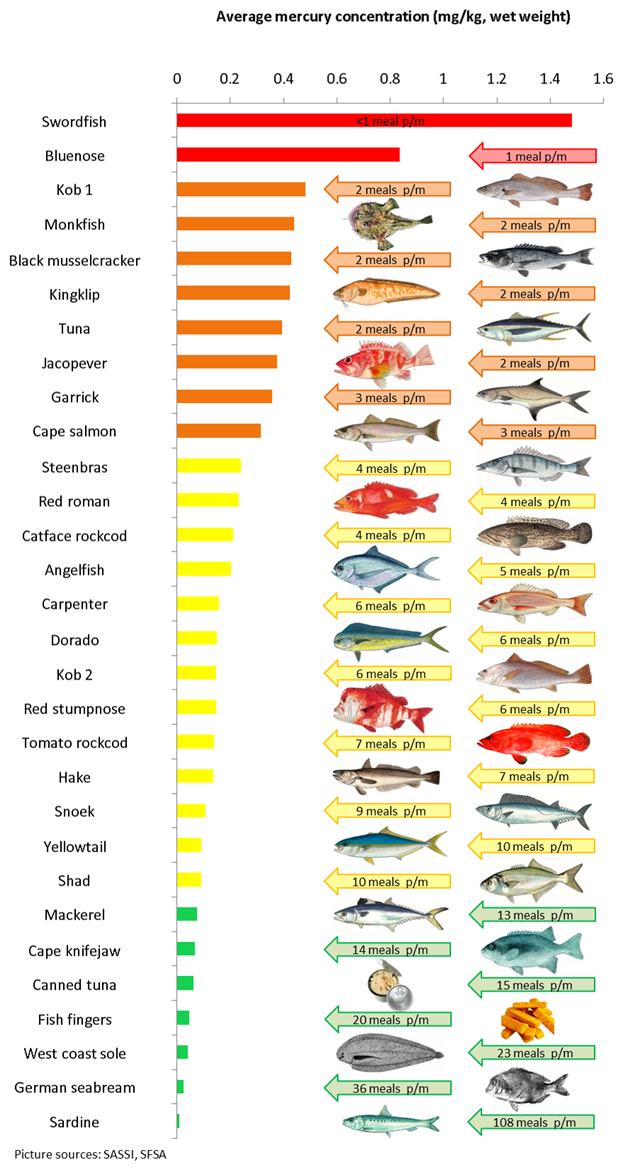
Fish is an essential part of a healthy diet. It’s rich in nutrients such as protein and vitamin D and is an excellent source of omega-3 fatty acids.
The downside is that it contains mercury, and a recent study shows the fish sold in South Africa’s retail stores contains mercury levels well above the World Health Organisation (WHO) guidelines.
Read: Mercury worse in marine fish
Swordfish contains most mercury
The study that was done by the Council for Scientific and Industrial Research (CSIR), found that swordfish contains the most mercury and the yellowtail the least amount of this neurotoxin.
“The risk depends on how much fish one eats,” says Dr Brent Newman, a principal researcher at the CSIR.
“The limit that is allowable for fish products sold to the public is 0,5 mg/kg for most fish, but allowance is made for naturally higher mercury accumulation in large predatory fish such as swordfish, tuna and so on, and for these the guideline is 1 mg/kg.”
“Our study determined the average mercury concentration in the fish we analysed, and found that the concentration for swordfish exceeds 1 mg/kg.”
Affecting the whole food chain
The fish were purchased in retail stores in the Durban and Cape Town areas over a period of 11 months. They were weighed, dissected and subsamples were analysed for the presence of mercury.
Fish naturally accumulate mercury in their tissue. However, the amount they accumulate depends on where they live, and what they eat. Top predators, such as marlin, tend to live quite long and, importantly, they accumulate the mercury in the meat of the fish they eat in their bodies.
“This is known as bio-magnification,” says Newman. “The concentration of a chemical, in this instance mercury, is magnified up the food chain.”
Read: Pregnant women urged to eat more fish

Adverse health effects
Newman says there are many potential health risks if too much mercury is consumed. These include:
- Nervous system damage
- Developmental delays
- Ataxia (loss of full control of bodily movements)
- Blindness
- Mental retardation
- Spasticity
“Death can result if exposure is excessive,” says Newman. “This is extreme and people will not typically be exposed to such high mercury concentrations.”
Know the symptoms
It’s often difficult to notice the subtle symptoms of too much mercury, but the following are common symptoms:
- Lack of concentration and coordination
- Impairment of speech, hearing, walking and peripheral vision
- Muscles can appear weak
- A feeling of “pins and needles”
Don’t cut out fish completely
Despite the research Newman cautions people to not be afraid to eat fish.
“Fish are very, very important in the human diet. What people should be doing is eating certain fish in moderation, based on the fish’s mercury content.”
“This applies especially to pregnant women, those that want to become pregnant and nursing mothers. This is because mercury is a potent neurotoxin, and the neurological systems of children and infants are especially susceptible to the toxic effects of mercury.”
Mercury can cross the placenta, and is also transferred in breast milk.
Read more:




 Publications
Publications
 Partners
Partners










